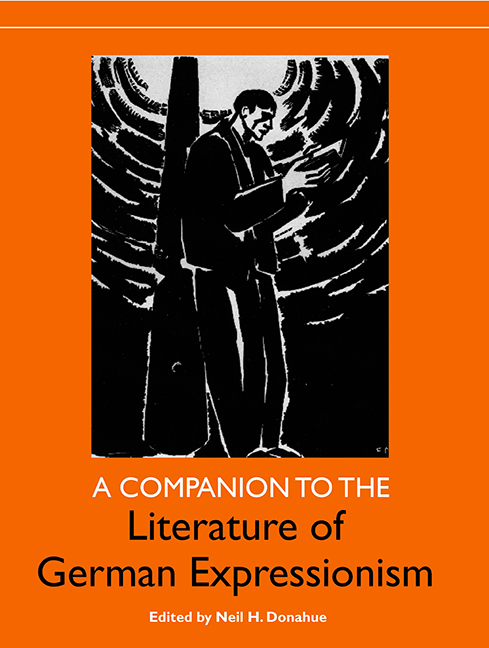Book contents
- Frontmatter
- Contents
- List of Illustrations
- Preface and Acknowledgments
- Chronology
- Introduction
- Philosophical Background
- Prose
- Poetry
- 5 Menschheitsdämmerung: The Aging of a Canon
- 6 Choric Consciousness in Expressionist Poetry: Ernst Stadler, Else Lasker-Schüler, Georg Heym, Georg Trakl, Gottfried Benn
- 7 Performing the Poem: Rituals of Activism in Expressionist Poetry
- Drama
- Interdisciplinary
- Select Bibliography
- Notes on the Contributors
- Index
5 - Menschheitsdämmerung: The Aging of a Canon
from Poetry
Published online by Cambridge University Press: 28 April 2017
- Frontmatter
- Contents
- List of Illustrations
- Preface and Acknowledgments
- Chronology
- Introduction
- Philosophical Background
- Prose
- Poetry
- 5 Menschheitsdämmerung: The Aging of a Canon
- 6 Choric Consciousness in Expressionist Poetry: Ernst Stadler, Else Lasker-Schüler, Georg Heym, Georg Trakl, Gottfried Benn
- 7 Performing the Poem: Rituals of Activism in Expressionist Poetry
- Drama
- Interdisciplinary
- Select Bibliography
- Notes on the Contributors
- Index
Summary
The original edition of Kurt Pinthus's acclaimed anthology of Expressionist poetry, Menschheitsdämmerung: Symphonie jüngster Dichtung (Dawn of Humanity: Symphony of New Poetry), has a publication date of 1920 but actually appeared in November 1919. It quickly became the first bestseller of a publishing house newly founded by Ernst Rowohlt after the end of the First World War. In 1922 a second edition appeared that was essentially unchanged in content but included in Pinthus's afterword a melancholy farewell to the exuberant humanism and emotionally charged idealism that characterize a large number of the collected poems. Pinthus's farewell echoes the widespread resignation and disappointment in Expressionist circles at the political turn of events. The success of his Menschheitsdämmerung has endured well beyond the initial sales and rave reviews given it by most contemporaries and has continued over the years playing an important role in the general reception of Expressionism. Menschheitsdämmerung has become, in fact, the single most celebrated and often cited document not only of Expressionist poetry, but of German literary Expressionism in general.
In 1959, forty years after the collection's first publication, Rowohlt decided to republish it in paperback. All but three of the original twenty-three poets had died, but for this “Dokument des Expressionismus” (Document of Expressionism) — Pinthus's new choice of subtitle — the timing was propitious. After being attacked in the thirties by the Nazis as degenerate — both Pinthus and his anthology fell under a Nazi ban in 1933 — and by some Marxists as an intellectual precursor of fascism, Expressionism was well on its way to rediscovery and rehabilitation in the Federal Republic of the fifties and sixties. The first significant exhibit of Expressionist works took place in Marbach in 1960. Eight years later, an East German publisher brought out an edition of Menschheitsdämmerung with a critically sympathetic introduction from a Marxist perspective, a measure of Expressionism's political recuperation as well (Mittenzwei, 5–26). More recently, the complete translation into English of all the poems in the anthology as well as Pinthus's various introductions testifies to its perceived significance in representing the literary activity of the Expressionist years.
- Type
- Chapter
- Information
- A Companion to the Literature of German Expressionism , pp. 137 - 156Publisher: Boydell & BrewerPrint publication year: 2005



